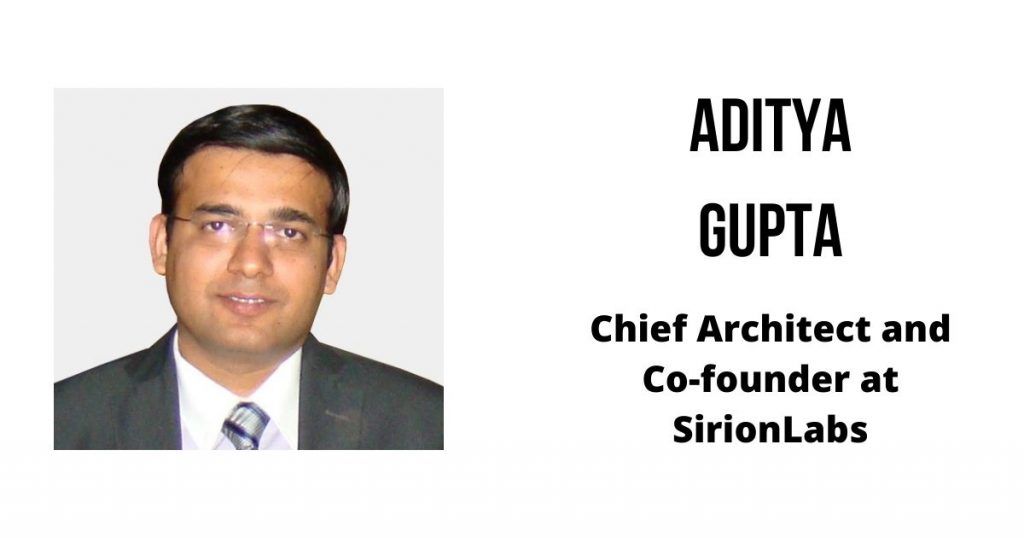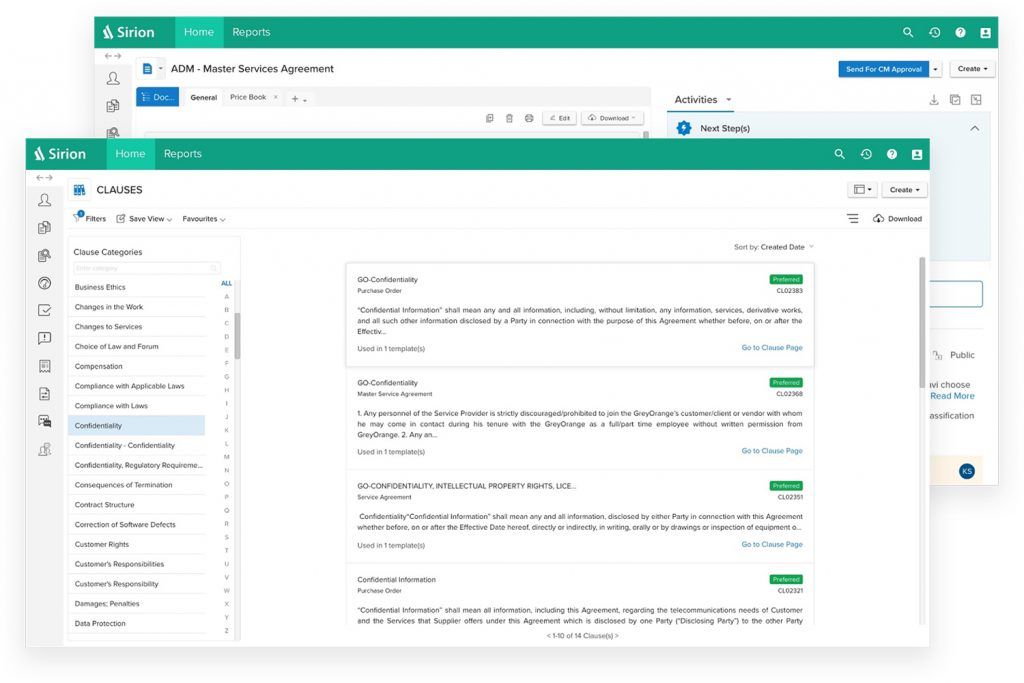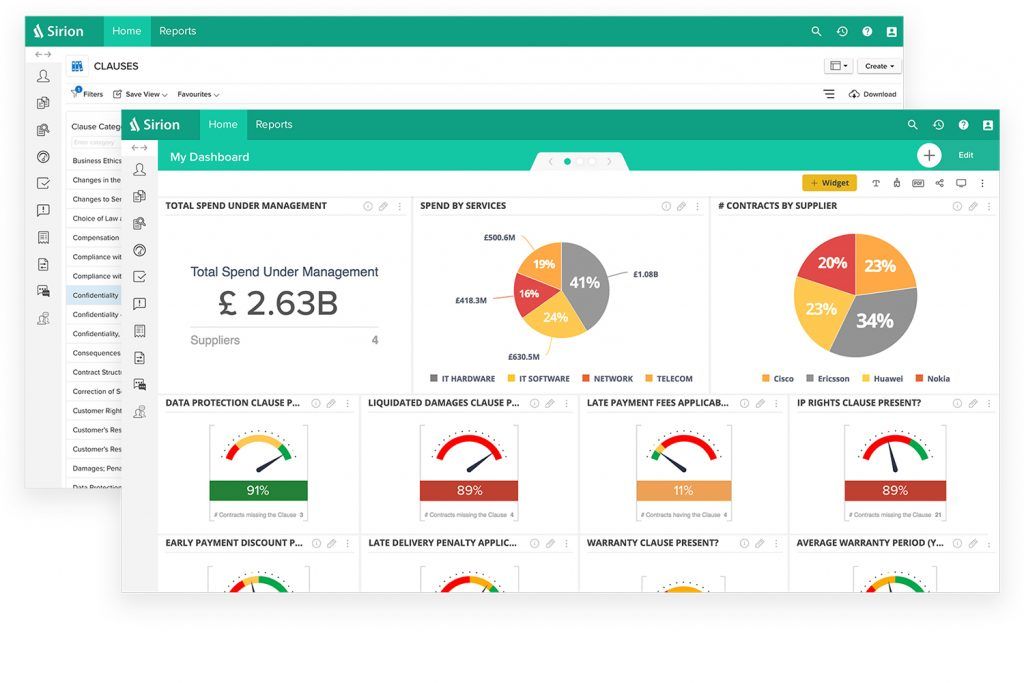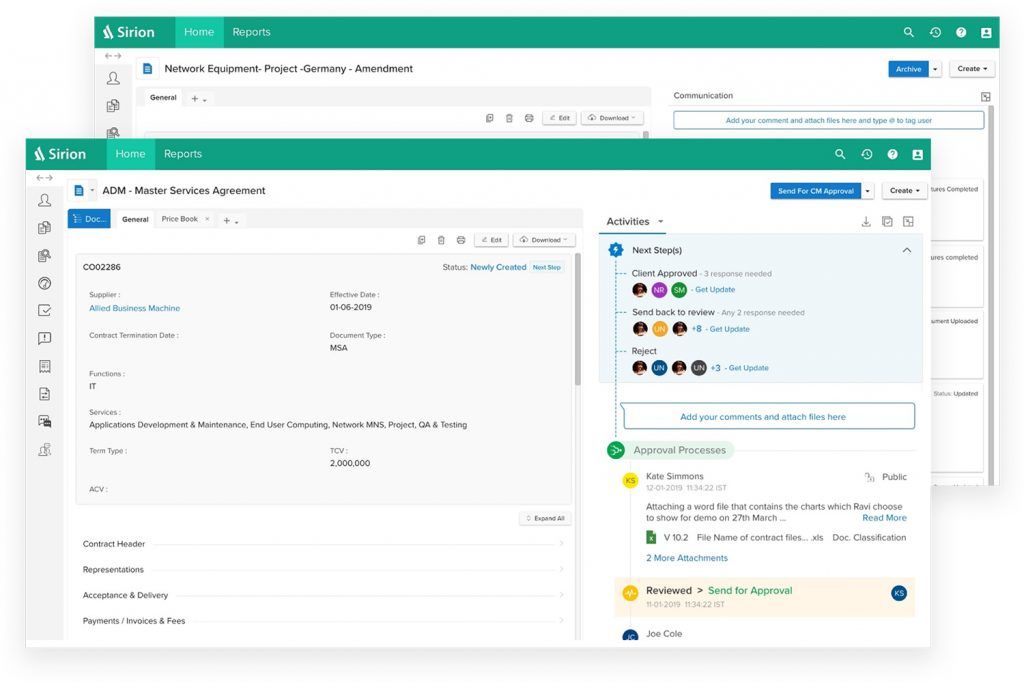To an outsider, contracts may not sound that big of a deal, but they are critical for any business. Companies spend hundreds of thousands of dollars on lawyers, and people who can not only manage the contracts better, but also see to their compliance, renewal, and more. A Contract Lifecycle Management (CLM) software makes this process more seamless and effortless. SirionLabs, a Seattle-headquartered company has been a pioneer in the space, having raised over $60million until now since its founding in 2012. We managed to catch up with Mr Aditya Gupta, SirionLabs’ Chief Architect and Co-founder about his journey, the company’s evolution, its roadmap, and more.
Related read: What are the benefits of using a Contract Management Software

Table of Contents
1. Before we begin talking about SirionLabs, can you share your journey into the world of SaaS?
Prior to SirionLabs, I was at UnitedLex where I was responsible for the creation of innovative software products for lawyers and contract professionals. One of the key products we created was an on-premise solution that had to be deployed in the customer’s IT environment. We faced many challenges during deployments, like massive time taken for infrastructure and user provisioning. Configuring the software to the client’s environment was never smooth and involved a stringent review and approval process with the in-house IT team. This complexity led the go live to go on for many months. Even worse, we had to go through this for every implementation with every customer. Roll out of software changes or updates, be it minor code changes, enhancements, or new releases also took a long time due to the checks and balances imposed by the client.
I was looking at solutions to overcome such obstacles and naturally found the SaaS model a perfect fit. That’s why when we founded SirionLabs we architected the platform in such a way to ensure it is a true multi-tenant SaaS platform for contract management. This has reduced the complexity involved in implementations, greatly reducing the time and money involved. SaaS implementations take days instead of months. Clients extract a lot more value faster and spend lesser. Further, we leverage the SaaS model to roll out new features, patches, and product enhancements in no time, almost every week. Our customers have instant access to these without having to worry about updating the software or the backend infrastructure. SaaS increases the accessibility of software to a wider range of customers, helping scale the solution to a wider ecosystem.
2. What insights led you to launch SirionLabs?
SirionLabs was founded in 2012 with the vision to help businesses realize the full value in their commercial engagements through AI-powered contract lifecycle management (CLM). Let us take a step back and look at the contract management industry. No matter the industry, every company handles contracts. This essential document is the foundation for all commercial engagements between enterprises – whether with suppliers or customers. These engagements have become increasingly complex over the past 10 to 15 years – especially driven by the emergence of strategic services as the dominant spend category. Despite the importance of contracts in an organization and an overwhelming movement towards digital transformation, legacy CLM solutions have failed to keep pace with this evolution. The traditional CLM industry has only offered a partial solution focusing on automating the contract creation process – with little functionality for tracking contracts after signature – where majority of the value resides. As a result, only 15 percent of Fortune 500 companies can measure performance against the contract in their commercial engagements. For those who do, it requires a lengthy audit spread across multiple teams. The remaining 85 percent lose 15 to 20 percent of their annual contract value due to invoicing errors, missed deliverables, claims and disputes, etc. – translating into a massive $2 to 3 trillion of enterprise value lost every year.
Along with my co-founders, we recognized the crucial role contract management plays in a company’s success and identified many gaps in the existing solutions. Leveraging our domain knowledge and expertise, we started building an AI-based CLM platform for managing the end-to-end contracting lifecycle on a single platform. From creating new contracts efficiently to ensuring granular monitoring of contractual deliverables, and data-driven relationship management, our vision was to make Sirion function as a central nervous system for both buyers and suppliers in enterprise engagements. This holistic approach would end up delivering improved savings/revenue for enterprises while driving improved business outcomes and better collaboration in commercial engagements.
3. Can you walk us through SirionLabs’ evolution since its inception?
As mentioned above, SirionLabs was founded with the goal of enabling organizations to extract maximum value from their commercial engagements. To achieve this, Sirion offers AI-powered solutions for the entire contracting lifecycle. While we identified gaps in various phases of the contracting lifecycle, we started building Sirion by focusing on the outcome perspective i.e. functionality for operationalizing contracts with post-signature performance management and contract governance. We believed this to be the toughest part of the contracting lifecycle to streamline and hence attacked it first. After a lot of hard work, we were able to launch Sirion’s performance management and governance functionality, becoming the first and only CLM in the market to offer this. After that, we started working on the creation perspective i.e. contract negotiation and authoring, digitization or repository, and auto-extraction of contractual metadata..

So, we started by building the more complex features (performance management & governance) and have since gone on to develop the relatively simpler functionality (authoring and repository). This is what separates SirionLabs in the market and has remained a key competitive advantage. Sirion is the only CLM platform to offer end-to-end contract management functionality, from authoring to repository to performance management.
4. Could you explain to our readers how contract lifecycle management works? And what are some of the behind-the-scenes aspects that people may not be aware of?
In simple terms, contract lifecycle management refers to the proactive management of a contract throughout its lifecycle – from negotiation and creation, digitization and storage, ongoing management to closure or renewal. Each of these activities require strong collaboration between various stakeholders internally as well as externally. Following are more details on each:
1. Contract Authoring: Involves the creation and execution of new contracts at scale with templates and clauses that are in line with the company’s approved positions. CLM tools with pre-configured approval workflows can reduce the time taken for the contract approval process as it typically involves many stakeholders.
2. Contract Negotiations: Refers to the back and forth involved in the legal review process with the counter-party, negotiating and finalizing the contractual terms, conditions, obligations. CLM tools can help automate this process, making the redlining process simpler and efficient and helping reduce the time taken to draft new contracts.
3. Enterprise Repository: Very critical, as it gives organizations complete visibility and control over their legacy contract portfolio. It involves intelligent storage of contracts in a central, digital repository to allow secure access to authorized users. Metadata captured for each contract enables quick search and retrieval of contracts. Without a repository, contracts are stuck in file cabinets.
4. Contract Extraction & Analytics: Contracts are a great source of rich information on all business relationships. Unless this information is captured as structured data, it is almost impossible for companies to make effective use of this critical information. Given the typical size of the enterprise contract portfolio, capturing this manually is not a practical option. This is where automated contract extraction comes in. In addition to granular capture of data from the contracts (beyond surface-level metadata), AI-powered CLM tools offer advanced analytics to identify risks and opportunities within an organization’s portfolio and enable smarter data-backed decision making around renewals, performance management, etc.
5. Performance management: Advanced CLM tools have enabled automation of post-signature contract management processes allowing real-time tracking of performance against the outcomes defined in the contract (like service levels and obligations), as well as automated validation of invoices. These features help organizations track the value delivered against the value promised during the contract creation phase, helping reduce value leakage which is a big problem as mentioned earlier.
5. Could you share how many customers you have now? And what kind of industries are using SirionLabs the most?
Users of our platform belong to 200+ of the world’s largest organizations across industry sectors including banking and finance, telecom, transportation, oil & gas, technology, manufacturing, healthcare, pharmaceutical, retail and consumer goods. Sirion is an industry-agnostic solution. Some of our clients are Vodafone, BP, Deutsche Post DHL, Qantas, and BNY Mellon.
6. How does SirionLabs stand out from the competition?

Contract lifecycle management (CLM) providers have traditionally focused on contract creation and storage. Sirion takes CLM far beyond with true ‘lifecycle’ management. In addition to transforming the traditional CLM areas of contract authoring and repository through AI, Sirion offers the most advanced post-signature functionality with performance management, invoice validation, and customer-supplier collaboration on a single, integrated platform. Sirion’s advanced technology is its core differentiator. From leveraging AI to drive improved efficiency and risk management during authoring to AI and ML-enabled digitization and auto-extraction, advanced automation for real-time performance monitoring and automated invoice validation, BI analytics engine, Sirion offers unmatched functionality.
During the authoring process, Sirion uses advanced AI technology to enable intelligent review of the contract draft against the approved enterprise clauses identifying the deviations – significantly reducing the time required for lawyers to manually complete this process. Additionally, it offers industry-leading integrations with MS-Word and MS-Outlook simplifying the negotiations process.
During the in-life phase of the contract, it performs a unique three-way reconciliation of performance (what happened) and invoice (what was invoiced) data against contracted obligations (what should have happened). This unique reconciliation is critical for managing strategic spend and is not offered by any other system on the market today. This enables Sirion to be the only CLM that delivers tangible ROI. It saves between 6-10% of the annual contract value in strategic supplier engagements.
Unlike other CLM tools that are used as back-end, efficiency tools, Sirion is a front-end collaboration platform. Sirion’s permissioned ledger architecture creates a shared view, a single source of truth for both customers and supplier teams improving alignment, transparency, and collaboration between them.
7. Could you shed a light on your marketing strategy to reach out to businesses?
Our marketing strategy is focused on achieving two key objectives: improving awareness for SirionLabs’ brand and demand generation. We use a multi-channel marketing approach to achieve this, with our marketing mix including participation in industry conferences, public relations, strategic alliances, social media, content marketing, analyst relations, and online advertising. All these activities are managed through a robust MarTech stack.
A key aspect of our marketing strategy has revolved around communicating our vision and thought leadership. To achieve this we conduct monthly webinars, publish whitepapers, newsletters, blogs, keynotes at conferences in collaboration with clients, prospects, partners, and analysts to communicate our positioning and vision for the contract management industry. As an example, over the past few months, we have conducted webinars with Deutsche Post DHL, KPMG, and Forrester. We have also seen a significant increase in analyst and industry recognition over the last couple of years – including being recognized as a Leader in the recently published Forrester Wave CLM 2021 Report, and a Visionary in Gartner’s 2020 CLM Magic Quadrant – which has helped us further put our brand out in the industry.
8. Can you talk about your experience of building a global product and how one should think about it?
There are many aspects to consider before building SaaS products, but there is only one place to start – the customer. Every product has a reason for its existence, there is a problem it is trying to solve which other solutions in the market are unable to solve or can solve partially. It is important to nail down why the product is needed, that will help you articulate your value proposition and know what features to focus on. The only way to build a great SaaS product or for that matter any product is by understanding your customer. Constantly talk to them, see them use the product and get their feedback, use the product like them and try to simulate their experience. You should be spending hours every day on the product yourself and think like your customers.
Take your initial customers very seriously. If they are unhappy, make sure you know why. Don’t try to rationalize their complaints, instead understand the reasons and resolve them. Your customers pay for your product and their voice, experience, feedback matter. Like my co-founder at SirionLabs, Kanti Prabha says, “There are no shortcuts to great product management. It’s a labor of love.” We have religiously followed this approach at SirionLabs, and our initial customers have played a big role in Sirion’s evolution.
Another aspect I would like to briefly touch upon is that once you have built a decent initial product, the biggest challenge you will face is managing customer expectations while creating a balanced roadmap. Once you expand your customer base, fulfilling all product enhancement requests is very difficult. When a customer asks for a capability, you need to determine if it deserves to be in your roadmap. Answering such questions will help you decide – will it help other customers, will it make your product better, the time it will take to build, will it open a new revenue stream, does it belong to some other category as opposed to yours. Whatever you decide, keep the customer informed of the progress and your final decision.
9. How has the ongoing pandemic affected SirionLabs – both in terms of businesses and no of users?

The pandemic has increased the uncertainty and complexity that organizations are having to deal with. As they navigate these times, trust and accountability have become highly important in business relationships. Our solution was built for times like this, allowing customers and suppliers to have greater control, visibility and governance while improving efficiencies. The interest in our product has only increased, as the focus on keeping supply chains up and running has put a renewed emphasis on the efficient execution and management of enterprise engagements.
In line with this, we have seen strong business growth and a significant increase in the number of users over the last 12 months. We have seen an increase in users from various departments- legal, procurement, finance, sales, vendor management, risk management etc. As a testament to our strong growth, we were named as one of the Fastest Growing Companies in North America on Deloitte’s 2020 Technology Fast 500™ list. Our recently launched contract extraction and analytics solution has seen great momentum since launch with several large organizations using this product including a leading global telecom provider, a multinational pharmaceutical company, a leading rail equipment manufacturer, and a leading energy company.
10. What are your favorite SaaS products out there?
My favorite SaaS products are Salesforce, Microsoft Office 365, and Slack. I like how the modular architecture of Salesforce makes it highly scalable. I also like how Slack has a deep penetration within the enterprise ecosystem and the way people work, giving users an interface regardless of the business application they use. While Salesforce is enterprise-grade, Microsoft Office 365 is end-user focused, and Slack is a communication platform for everyone – developers and end-users. That is why I love SaaS; it enables the development of software with a wide range of use-cases.






